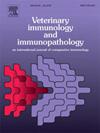评估水牛接种两剂 I 型烧伤柯西氏菌灭活疫苗后的阶段性特异性抗体反应
IF 1.4
3区 农林科学
Q4 IMMUNOLOGY
引用次数: 0
摘要
目前,反刍动物 Q 热疫情的控制和管理主要依靠疫苗接种。虽然水牛(Bubalus bubalis)在多个国家被集中养殖,并且是柯西氏菌病的贮藏库,但目前还没有证据表明对该物种接种疫苗的效果。这项工作旨在通过实地研究,使用适当的特异性酶联免疫吸附试验评估体液反应以及对水牛流产率的影响。共给 15 头血清阳性和 20 头血清阴性的水牛接种了两次商用 I 期疫苗,每次间隔三周,并在接种过程中测定了特异性抗体。虽然接种后抗 I 期抗体反应性比 I 期抗体反应性更强,但抗 I 期抗体反应性和抗 II 期抗体反应性在第一次接种后(p = 0.001)和第二次接种后(p = 0.05)都显著增加。血清转换与年龄或自然感染状况无明显关系。疫苗接种周期结束后,群体研究观察到流产率和胎盘滞留率降低。我们的数据表明,疫苗主要诱导了与山羊和绵羊相似的抗体反应。这些初步数据似乎支持在水牛中接种疫苗,即使是血清反应阳性的动物,不过还需要进一步研究,以更好地确定该物种血清转换的动态。本文章由计算机程序翻译,如有差异,请以英文原文为准。
Evaluation of the phase-specific antibody response in water buffalo (Bubalus bubalis) after two doses of an inactivated phase I Coxiella burnetii vaccine
The control and management of Q fever outbreaks in ruminants are currently based on vaccination. Although buffalo (Bubalus bubalis) are intensively farmed in several countries and represent a reservoir for Coxiellosis, no evidence has been described regarding the efficacy of vaccination in this species. This work aimed to evaluate the humoral response, using appropriate phase-specific ELISAs, and the effects on abortion rate in buffalo by a field study. A total of 15 seropositive and 20 seronegative animals were vaccinated twice, three weeks apart, with a commercial phase I vaccine, and phase-specific antibodies were determined in the course of vaccination. Although anti-phase II antibody reactivity predominated after vaccination compared to phase I, both anti-phase I- and -phase II-antibody-reactivity significantly increased after the first (p = 0.001) and again after the second vaccination (p = 0.05). Seroconversion did not significantly depend on age or natural infection status. Once the vaccination cycle was completed, the herd study observed a reduced rate of abortion and placenta retention. Our data demonstrated that the vaccine principally induced a similar antibody response as in goats and sheep. These preliminary data appeared to support vaccination in buffalo, even in seropositive animals, although further studies are needed to better define the dynamics concerning seroconversion in this species.
求助全文
通过发布文献求助,成功后即可免费获取论文全文。
去求助
来源期刊
CiteScore
3.40
自引率
5.60%
发文量
79
审稿时长
70 days
期刊介绍:
The journal reports basic, comparative and clinical immunology as they pertain to the animal species designated here: livestock, poultry, and fish species that are major food animals and companion animals such as cats, dogs, horses and camels, and wildlife species that act as reservoirs for food, companion or human infectious diseases, or as models for human disease.
Rodent models of infectious diseases that are of importance in the animal species indicated above,when the disease requires a level of containment that is not readily available for larger animal experimentation (ABSL3), will be considered. Papers on rabbits, lizards, guinea pigs, badgers, armadillos, elephants, antelope, and buffalo will be reviewed if the research advances our fundamental understanding of immunology, or if they act as a reservoir of infectious disease for the primary animal species designated above, or for humans. Manuscripts employing other species will be reviewed if justified as fitting into the categories above.
The following topics are appropriate: biology of cells and mechanisms of the immune system, immunochemistry, immunodeficiencies, immunodiagnosis, immunogenetics, immunopathology, immunology of infectious disease and tumors, immunoprophylaxis including vaccine development and delivery, immunological aspects of pregnancy including passive immunity, autoimmuity, neuroimmunology, and transplanatation immunology. Manuscripts that describe new genes and development of tools such as monoclonal antibodies are also of interest when part of a larger biological study. Studies employing extracts or constituents (plant extracts, feed additives or microbiome) must be sufficiently defined to be reproduced in other laboratories and also provide evidence for possible mechanisms and not simply show an effect on the immune system.

 求助内容:
求助内容: 应助结果提醒方式:
应助结果提醒方式:


